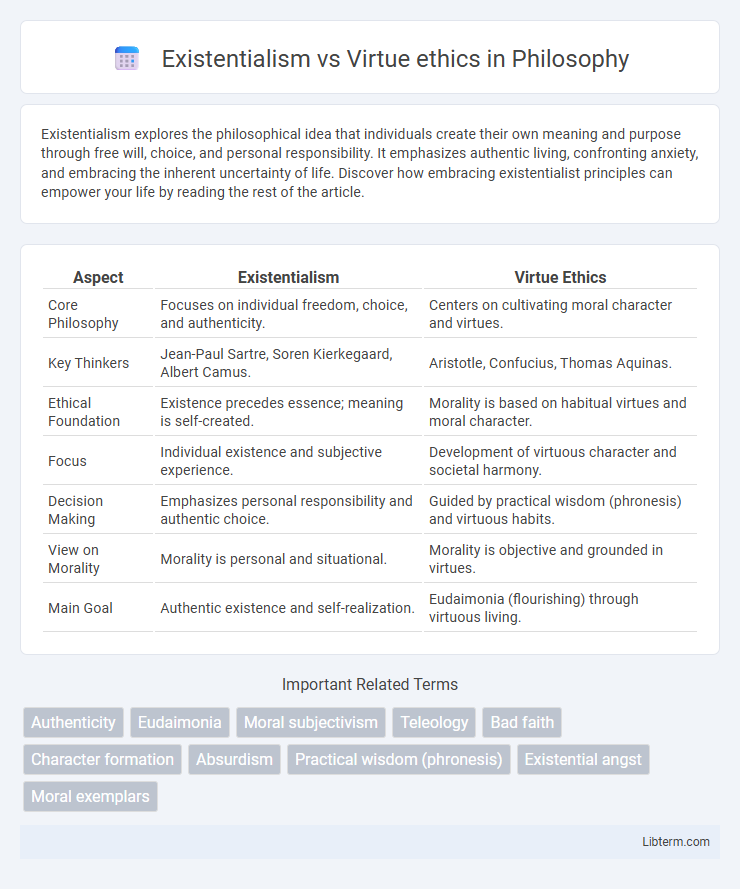Existentialism explores the philosophical idea that individuals create their own meaning and purpose through free will, choice, and personal responsibility. It emphasizes authentic living, confronting anxiety, and embracing the inherent uncertainty of life. Discover how embracing existentialist principles can empower your life by reading the rest of the article.
Table of Comparison
| Aspect | Existentialism | Virtue Ethics |
|---|---|---|
| Core Philosophy | Focuses on individual freedom, choice, and authenticity. | Centers on cultivating moral character and virtues. |
| Key Thinkers | Jean-Paul Sartre, Soren Kierkegaard, Albert Camus. | Aristotle, Confucius, Thomas Aquinas. |
| Ethical Foundation | Existence precedes essence; meaning is self-created. | Morality is based on habitual virtues and moral character. |
| Focus | Individual existence and subjective experience. | Development of virtuous character and societal harmony. |
| Decision Making | Emphasizes personal responsibility and authentic choice. | Guided by practical wisdom (phronesis) and virtuous habits. |
| View on Morality | Morality is personal and situational. | Morality is objective and grounded in virtues. |
| Main Goal | Authentic existence and self-realization. | Eudaimonia (flourishing) through virtuous living. |
Introduction to Existentialism and Virtue Ethics
Existentialism centers on individual freedom, choice, and the search for meaning in an indifferent or absurd world, emphasizing authentic existence and personal responsibility. Virtue ethics, rooted in Aristotelian philosophy, prioritizes character development and the cultivation of virtues such as courage, temperance, and justice to achieve eudaimonia, or human flourishing. Both frameworks address ethical living but diverge in their approach: existentialism focuses on subjective experience and authenticity, while virtue ethics emphasizes objective moral character and habitual excellence.
Historical Backgrounds of Both Philosophies
Existentialism emerged in the 19th and 20th centuries, with key figures such as Soren Kierkegaard and Jean-Paul Sartre emphasizing individual freedom, choice, and authentic existence amid an absurd or meaningless world. Virtue ethics traces back to ancient Greece, primarily developed by Aristotle, who centered ethics on character development and the pursuit of eudaimonia, or human flourishing, through cultivating virtues. These distinct historical contexts shaped existentialism's focus on personal subjective experience and virtue ethics' emphasis on objective moral character cultivated through practice.
Core Principles of Existentialism
Existentialism centers on individual freedom, authentic existence, and personal responsibility in an indifferent or absurd universe, emphasizing subjective experience and the creation of meaning through choices. Unlike virtue ethics, which prioritizes cultivating moral character and virtues for flourishing within a community, existentialism rejects predefined moral frameworks, asserting that individuals must define their own values. Core principles include angst, absurdity, freedom, and commitment, highlighting the struggle to live genuinely amid uncertainty.
Fundamental Tenets of Virtue Ethics
Virtue ethics centers on character traits or virtues such as courage, temperance, and justice as essential to moral behavior, emphasizing the development of good habits over rigid rules or consequences. Existentialism prioritizes individual freedom, choice, and authenticity, highlighting personal responsibility in creating meaning in an indifferent world. The fundamental tenets of virtue ethics involve cultivating moral virtues through practice to achieve eudaimonia, or human flourishing, contrasting existentialism's focus on subjective experience and existential angst.
Human Freedom and Moral Responsibility
Existentialism emphasizes radical human freedom, asserting that individuals must create their own meaning and bear full moral responsibility for their choices without predetermined essence. Virtue ethics centers on developing character traits or virtues that guide moral actions, viewing freedom as the cultivation of rational and moral excellence within a social context. The debate contrasts existentialism's focus on subjective autonomy and accountability with virtue ethics' emphasis on objective moral character and communal flourishing.
The Role of Authenticity vs. Character Development
Existentialism emphasizes authenticity as the foundation of personal freedom, urging individuals to live truthfully according to their own values despite external pressures. Virtue ethics centers on the development of moral character through habituation and practice, aiming to cultivate virtues that guide ethical behavior consistently. The tension between existentialist authenticity and virtue ethics' character development reflects the contrast between self-defined meaning and communal moral excellence in ethical decision-making.
Approaches to Ethical Decision-Making
Existentialism emphasizes individual freedom, choice, and authentic responsibility in ethical decision-making, urging individuals to create their own values in an often absurd world. Virtue ethics focuses on cultivating moral character and virtues, such as courage and wisdom, guiding decisions through the development of good habits and moral excellence. Existentialism centers on subjective experience and personal meaning, while virtue ethics relies on objective traits and communal flourishing to inform ethical choices.
Meaning, Purpose, and Moral Life
Existentialism emphasizes individual freedom, authentic choice, and creating personal meaning in an inherently meaningless world, focusing on subjective purpose in moral life. Virtue ethics centers on cultivating character traits like courage, temperance, and wisdom to achieve eudaimonia, or flourishing, which gives life objective meaning and moral guidance. Both frameworks address meaning and purpose by guiding ethical behavior, with existentialism prioritizing self-defined values and virtue ethics prioritizing established moral virtues.
Critiques and Contemporary Relevance
Existentialism faces critiques for its emphasis on individual freedom leading to potential moral relativism and neglect of social responsibilities, while virtue ethics is challenged for its ambiguity in defining and applying virtues universally across diverse cultures. Contemporary relevance of existentialism lies in addressing personal authenticity and meaning in an increasingly fragmented world, whereas virtue ethics offers a framework for character development and ethical behavior in complex professional and social contexts. Both philosophies contribute to ongoing debates in moral philosophy, highlighting tensions between individual agency and communal values.
Comparative Analysis: Existentialism vs. Virtue Ethics
Existentialism centers on individual freedom, personal responsibility, and creating meaning in an indifferent universe, emphasizing subjective experience and authenticity. Virtue ethics, rooted in Aristotelian philosophy, prioritizes character development and cultivating virtues as the foundation for moral behavior within social contexts. While existentialism challenges inherited moral frameworks through personal choice, virtue ethics stresses habitual practice and communal values to achieve human flourishing.
Existentialism Infographic

 libterm.com
libterm.com